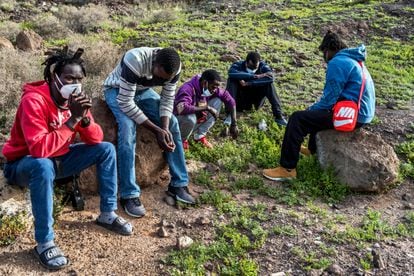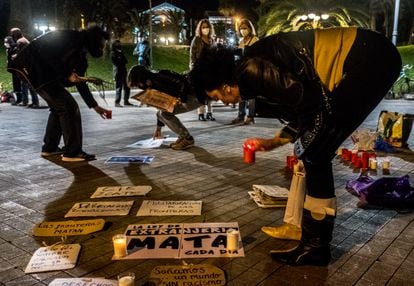Rejecting migrant camps, many Africans end up sleeping on the streets in Spain’s Canary Islands
Hundreds of undocumented arrivals are refusing transfer to these centers out of fear of deportation, and are now getting by with help from citizen groups and charity organizations
/cloudfront-eu-central-1.images.arcpublishing.com/prisa/5U4HAY6E55AKFGDUUYBFNSIFV4.jpg)

Ousmane Diop, a 27-year-old from Senegal, arrived in Spain’s Canary Islands four months ago. At first he was housed in tourist accommodation on Gran Canaria, in the popular tourist destination of Puerto Rico, in the southern part of the island.
Then he was told that he would be transferred to Las Raíces, a large migrant camp set up by the military on the nearby island of Tenerife. The facilities, located within the city limits of La Laguna, can house up to 1,400 people.
“At the hotel, all I did was eat and sleep. At the camp, it was going to be worse, and from there they were going to send us back to Senegal,” he says.
Diop wants to train to be a welder, and has decided to fend for himself – even if it means sleeping out on the street. After walking out of the hotel in Puerto Rico, he made his way to the island capital, Las Palmas de Gran Canaria. He still doesn’t have a place to stay.
Non-profit groups estimate that there are hundreds of people like Diop who have opted out of the shelter system and are now sleeping in ravines, parks, building doorways and shacks and who depend on the charity group Cáritas for food. Others got luckier and found a place to live thanks to groups such as Somos Red, a spontaneous citizen network created specifically to provide assistance to migrants in this situation. “We figure there are hundreds of them trying to get by, feeling scared, hiding from the police and other threats in the shape of violence,” says Antonio Santana Miranda, a member of Somos Red.

“When the transfers to the camps began, stories began to spread among the migrants that from these centers, they’d be deported back to their home countries,” adds this volunteer. “They also knew that if they wanted to, they could just walk out and move around freely. So many made that choice, finding themselves out on the street since early February.”
EL PAÍS unsuccessfully queried the Spanish government’s delegation in the Canaries, as well as the Office of the Secretary of State for Migrations, to find out how many migrants have refused to go to the camps. The Somos Red citizen group has found accommodation for 23 people.
Last Saturday, while a group of citizens marched in a protest against “illegal immigration” encouraged by the far-right party Vox, Somos Red was distributing clothing to migrants at a city square. Ousmane Diop showed up to collect a few t-shirts and a backpack. Atou Yade, 23, and Samba, 22, picked up warm clothes for the cold nights out in the open.
Samba, who has been in the Canary Islands since late November, wants to work as a car mechanic. “In Puerto Rico, we were told that if we got sent to Las Raíces [migrant camp], it would be the step before getting sent back to Senegal. And I don’t want that. I just want some help so I can start working.”
“It’s not true that going to Tenerife means that the next day they’re going to get deported,” says Mamé Cheik, president of the Federation of African Associations in the Canary Islands. “In fact, they might have a better chance of going to mainland Spain from these centers.”

The first migrants to sleep out on the streets of Gran Canaria were mostly Moroccans. They had been kicked out of the hotels for violating the code of conduct, or for being gone for more than three days. But when the transfers to the migrant camps began, the profile began to change.
Local authorities in San Bartolomé de Tirajana admit that there are at least 100 migrants sleeping in parks. In Las Palmas de Gran Canaria, the city is providing some support measures, but will not give any specific figures. And in Mogán, city officials said that there are no longer any Sub-Saharan Africans sleeping on the streets.
According to the charity group Cáritas, the number of people using their food pantries in Gran Canaria grew 72% in January from the previous month. In early January, the organization was handing out between 170 and 190 meals a day. This week, that number had shot up to 370. “Nearly all of those new people are migrants who left the apartments and shelter services and are now out on the street,” said a Cáritas source.
Government strategy
Ever since the Canaries experienced a new peak in arrivals in mid-2020, the Spanish government – with support from the European Union – has tried different strategies to stem the flow.
The most vulnerable migrants have been taken to the mainland, but these cases are few and far between. Starting in December, and based on legal initiatives to enforce health restrictions derived from the coronavirus pandemic, the police began to block port and airport access to migrants who could have otherwise made the journey with a valid passport.
Under pressure, the government has started to speed up the transfers. Sources familiar with the situation said that there have been 3,500 authorizations, but it is unclear how many of these transfers have already taken place. The Interior and Migration ministries have not offered any information about them.
Just a few weeks after its opening, the Las Raíces camp has become a cursed destination. Several people have been camping outside for days to protest the conditions inside. “It’s really cold in there, there isn’t enough food, and a lot of people are telling us that from there, they send you back to your country,” says Ndiak, one of the Senegalese nationals who was helped out by Somos Red in Gran Canaria. “Now we’re afraid that the police will show up any moment, arrest us and deport us.”
The camp is run by a non-profit named Accem. Sources at this organization told EL PAÍS that they are “working hard to offer the best possible assistance” to the migrants. “Putting together an initiative like this one is not simple. Different needs and shortcomings arise on a daily basis, and as soon as we detect them we try to solve them,” said Accem spokesperson Santiago Gómez-Zorrilla Sánchez. “There are surely things that can be improved on, and we are doing our best to do so.”
With additional reporting by María Martín.
English version by Susana Urra.
More information
/cloudfront-eu-central-1.images.arcpublishing.com/prisa/VJZJ2R6FIBB2DBXV3IS5DQ42ZE.JPG)
/cloudfront-eu-central-1.images.arcpublishing.com/prisa/7IJGQ6SIPZFCFHK2W3AYD55GDM.aspx)










































